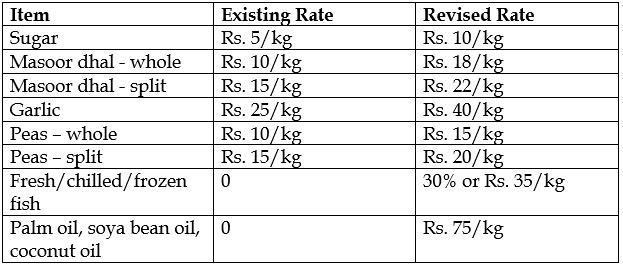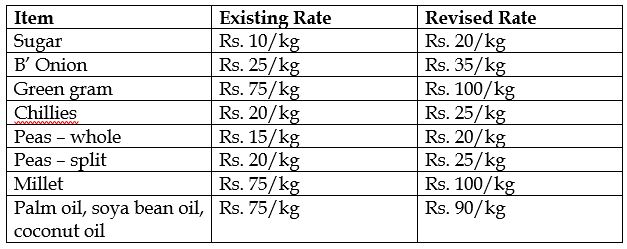News
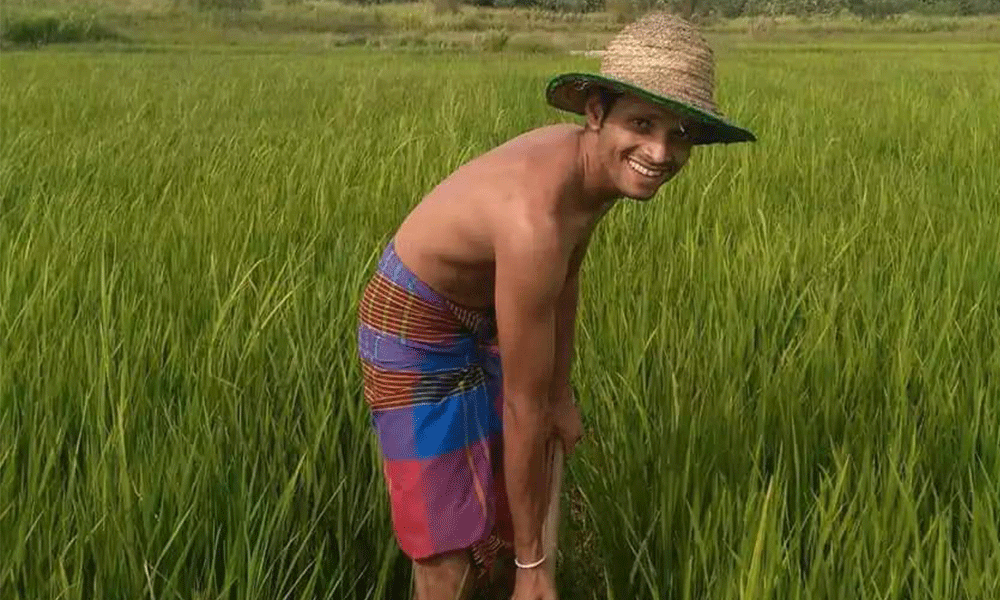
Namal Kumara of 'presidential assassination plot' fame to contest from SLPP
Operations Director of the Anti-Corruption Force, Namal Kumara, has said that he is prepared to contest the general election at any time. He also said that he has decided to contest from the Sri Lanka Podujana Peramuna (SLPP).
Namal Kumara became a controversial character as he revealed of an alleged assassination plot to kill several prominent figures in the country including President and Gotabaya Rajapaksa, the brother of SLPP leader Mahinda Rajapaksa.
During president Sirisena’s first address to the nation after the appointment of Mahinda Rajapaksa as prime minister, he stated that this alleged assassination plot exposed by Namal Kumara has been one of the reasons for him to sack Ranil Wickremesinghe.
However, with Kumara planning to contest under the SLPP, political analysts point out that the whole assassination plot could be a fabrication to justify the unconstitutional appointment of Mahinda Rajapaksa to the post of prime minister.
A figure previously known mostly among nationalist groups, he has now been thrust into the limelight while his sketchy past has cast a doubt on his claims with many others questioning his mental state.
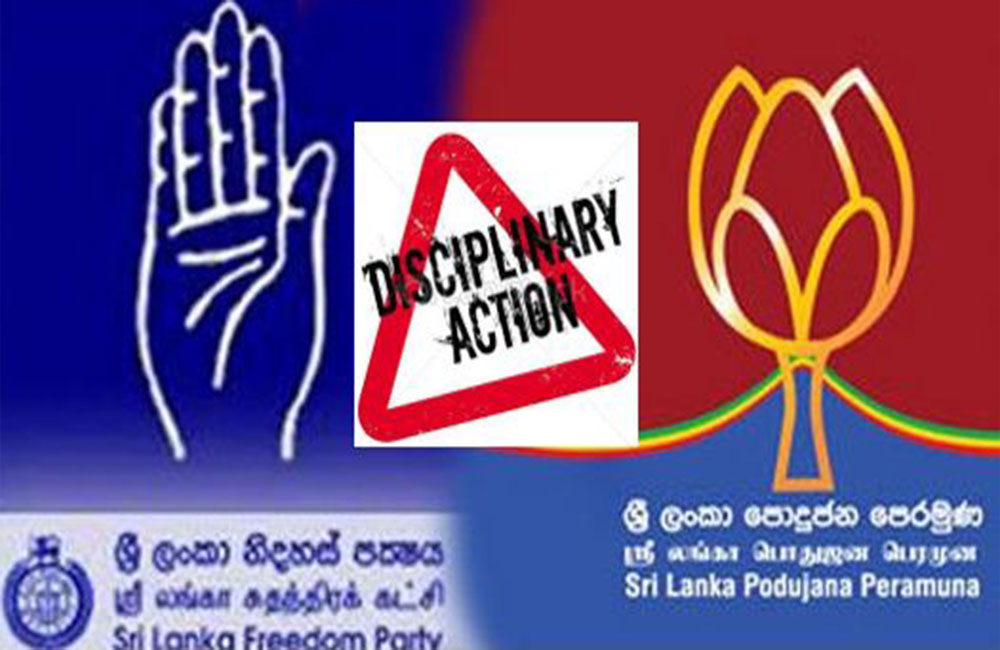
SLFP to take disciplinary action against 33 MPs for joining 'Pohottuwa'
The Sri Lanka Freedom party (SLFP) will take disciplinary action against newly appointed Prime Minister Mahinda Rajapaksa and 33 SLFP MPs for obtaining the membership of the Sri Lanka Podujana Peramuna (SLPP), yesterday (11), the SLFP said.
President MaIthripala Srisena who is also the chairman of the SLFP has issued this directive to party general secretary Rohana Luxman Piyadasa as the action of the group led by Mahinda Rajapaksa will create divisions within the SLFP.
The SLFP Central Committee will appoint a disciplinary action committee to conduct inquiries against all the SLFP members who have joined the SLPP leaving their respective party, a top official at the SLFP office in Colombo said.
According to SLFP Constitution, disciplinary action could be taken against members over their action of joining another political party, promoting another Party, aiding or helping another Party as such actions are not allowed, he said. Those who engage in such action can be expelled from the Party, he added.
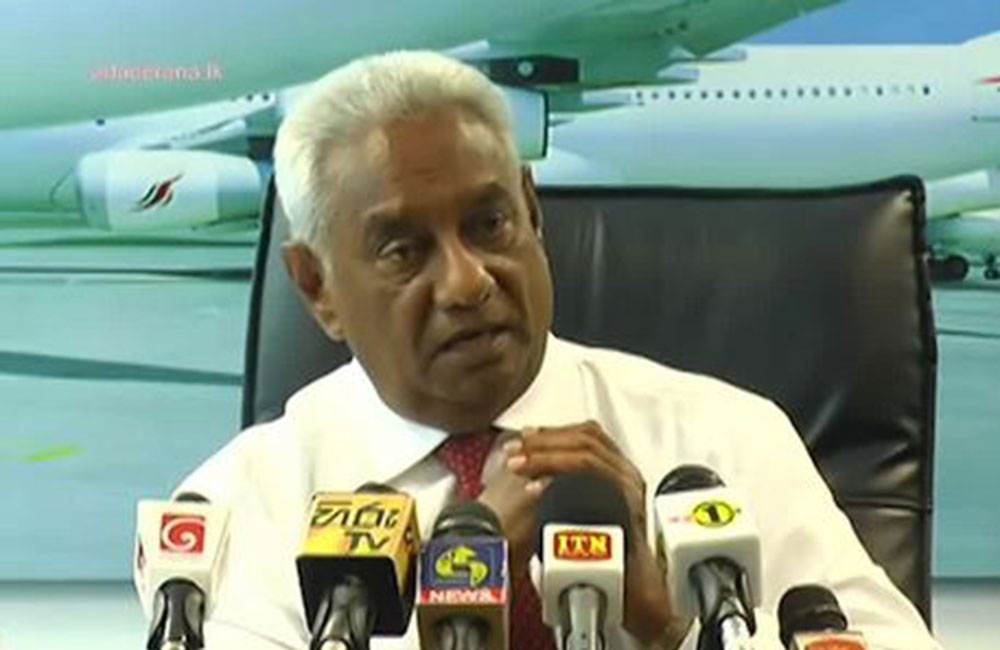
Chairman of Sri Lankan Airlines Resigns
Veteran banker Ranjith Fernando has resigned from the post of chairman Sri Lankan Airlines after serving for six months at the helm of the national career following the customary procedure during the change of government, informed sources said.
Fernando told the Sunday Times online that he tendered his resignation to the transport ministry secretary after newly appointed cabinet minister’s assumption of office allowing him to appoint his nominee to head the Airline.
However, there was no immediate confirmation of resignations of other members of the board of directors comprising Mano Tittawella, Susantha Katugampala, Dr. Roshen Perera, and Air Marshal Kapila Jayampathy.
Fernando was chosen to head the Board based on his experience in transforming the then State-owned National Development Bank where he served from its inception in 1979 until his retirement in 2001.
He has functioned as the Secretary of the Ministry of Industries, Urban Development Authority and as Chairman of several public listed companies.
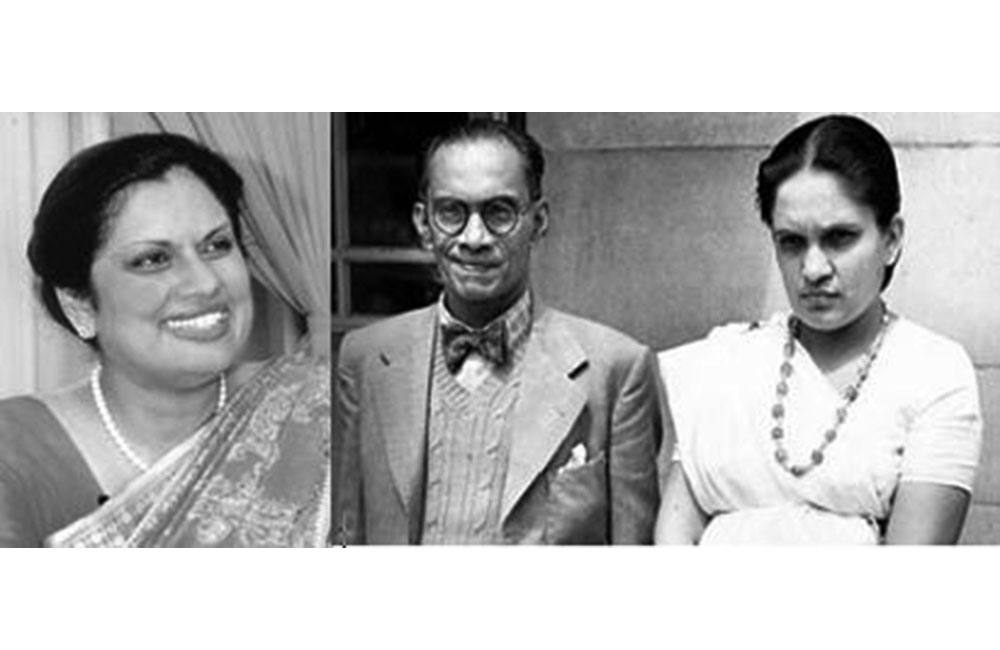
CBK to rescue SLFP
Former president Chandrika Bandaranaike Kumaratunga has vehemently condemned attempts by certain persons to repress the Sri Lanka Freedom Party (SLFP) by betraying aspirations of the 2015 Jan. 08 victory through joining those who were against the public.
A statement issued by Ms. Kumaratunga's media unit states that although the SLFP, together with a host of other parties and groups had won the battle to bring in a clean governance, anti-SLFP forces are attempting to suppress the SLFP after joining the Sri Lanka Podujana Peramuna (SLPP).
Noting that she will not leave the party regardless of whoever does, Ms. Kumaratunga further pledges that she, together with genuine SLFPers will do all it takes to rebuild the party and make it victorious.
(Sri Lanka Mirror)
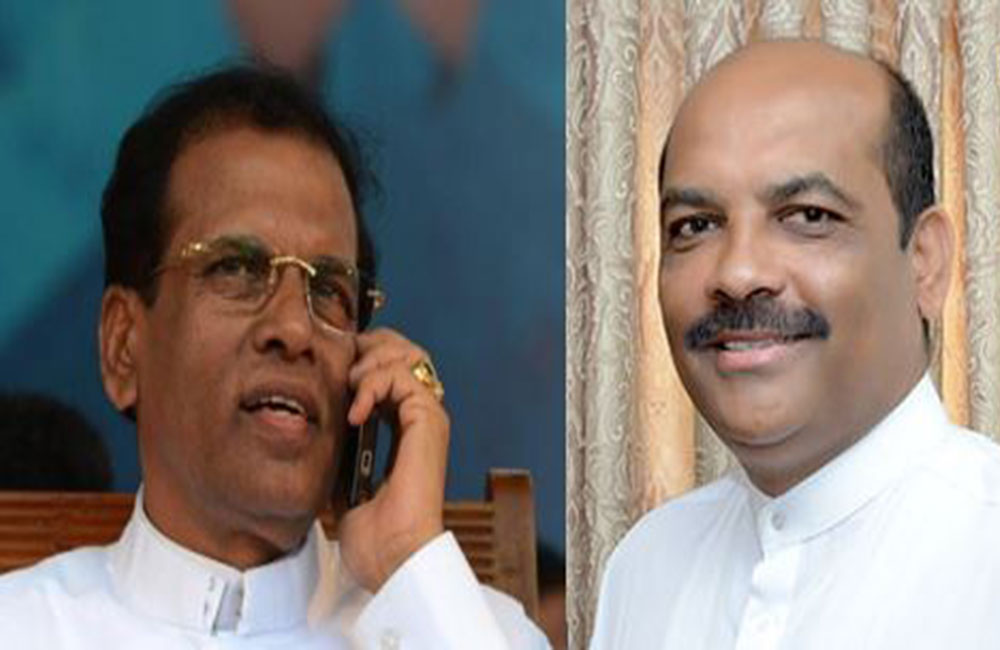
Horse trade of MPs; Sirisena calls Range Bandara
President Maithripala Sirisena on Sunday (11) defended his unconstitutional dissolution of parliament, stating that the decision was taken to prevent violent clashes among rival legislators and "horse-trading of MPs".
However, a telephone conversation between Sirisena and former minister Palitha Range Bandara going viral on social media shows the President inquiring from Range Bandara about the possibility of joining his newly formed government.
The former minister stated that although he had no issues of working with Sirisena, he had very strong reservations about working with Mahinda Rajapaksa, who Sirisena appointed as the Prime Minister last month.
"It was sad that parliamentarians were being traded for LKR 100 to 500 million,” Sirisena said during his address to the nation yesterday, referring to statements made by some of the parliamentarians that they were offered huge money to switch sides.
In the telephone conversation however, Sirisena invites the former minister to meet him sometime later and discuss further about the possibility joining him in the government.
The recording of the conversation can be found below.
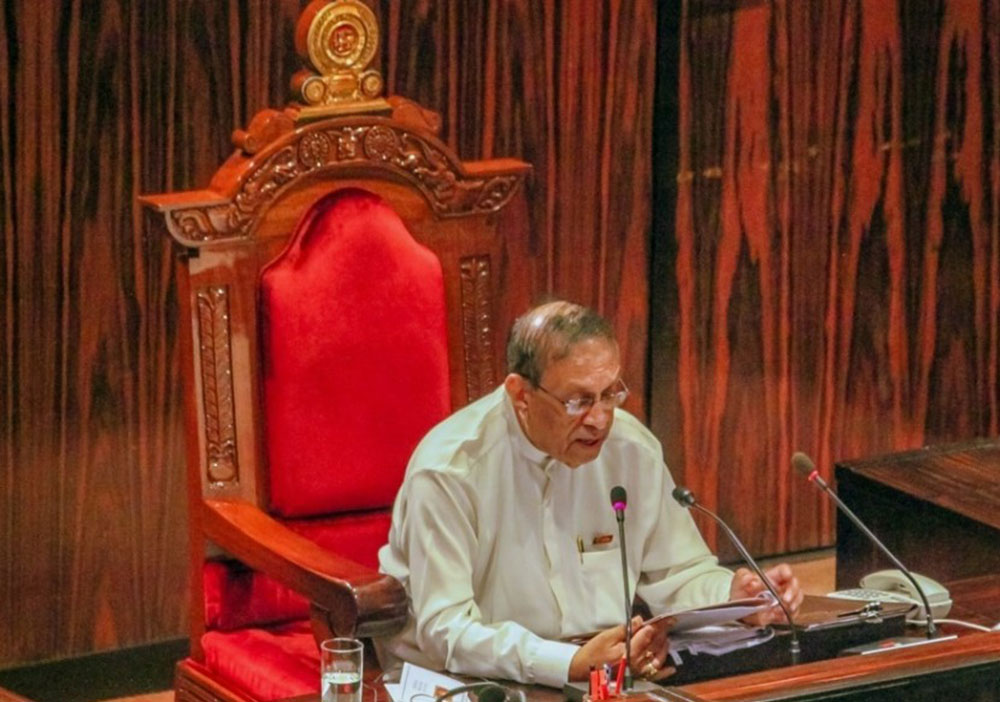
The Executive has 'usurped' Parliament leaving the rights & freedoms of citizens at grave risk: Speaker
Speaker Karu Jayasuriya issued another strong statement today (11), urging public servants to refrain from carrying out "illegal orders" while accusing president Maithripala Sirisena of “usurping” the rights of legislators.
Jayasuriya emphasized that the executive has treated Parliament with "willful disregard", leaving the rights and freedoms of citizens at grave risk.“I have watched over the last two weeks as the executive branch has seized the rights and usurped the powers of members of parliament who were elected to represent the people. I call upon all public servants to refuse to execute any illegal orders they may receive, no matter from whom," Jayasuriya said.
Just five days before parliament was due to reconvene, after having agreed thrice to reconvene, Sirisena dissolved it and called for snap elections in January.
"Since the president has prevented parliament from ruling on the legitimacy of the president's actions, it will be up to the Supreme Court to determine the legality of these actions," Jayasuriya said.
Jayasuriya categorically denied claims made by the "purported foreign minister", Sarath Amunugama, who said parliament was dissolved because Jayasuriya was planning to prevent an address by the president when the House reconvened on Wednesday.
"I wish that the purported minister had proposed a more honest and plausible excuse for the actions of his colleagues, that would have drawn less ridicule to our country on the world stage," Jayasuriya said.
"Based on this fiction, several of his cohorts have openly threatened to send me to jail," Jayasuriya said, adding that he would gladly face any consequence for his actions to defend the rights of legislators.
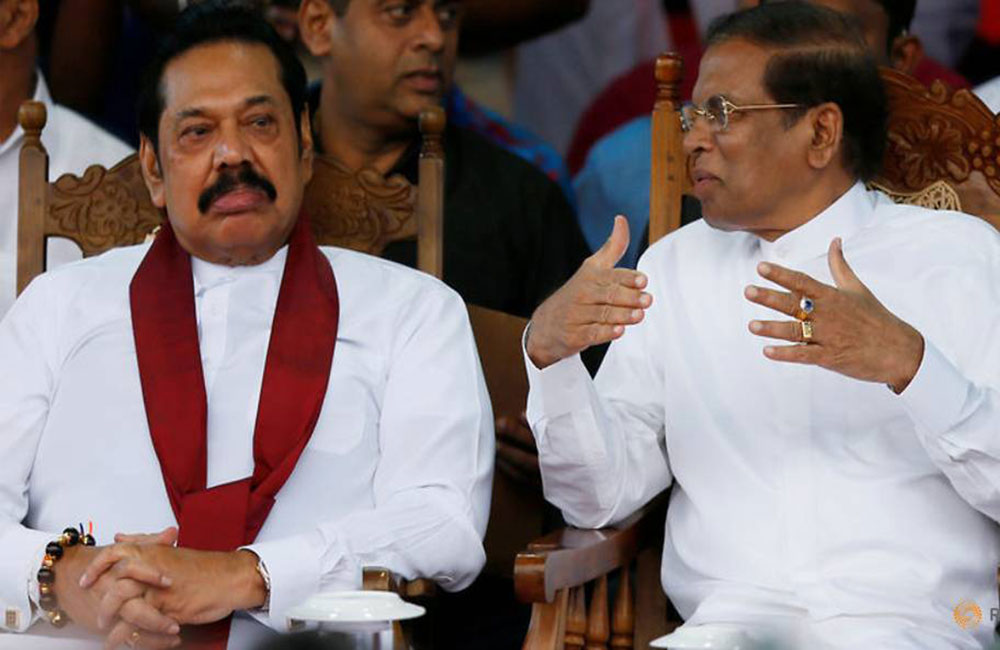
Western diplomats shun meeting with Foreign Minister on political crisis
Eight Western countries stayed away from a meeting with Sri Lanka's government on Monday to register their protest against President Maithripala Sirisena's decision to dissolve parliament, diplomatic and government sources said.
Sri Lanka has been in political turmoil since Sirisena fired Prime Minister Ranil Wickremesinghe last month and appointed a pro-China former president, Mahinda Rajapaksa, in his place.
Western countries led by the United States and the European Union had been urging Sirisena to convene parliament and let the legislature determine who should be prime minister.
Sirisena reconvened parliament on Nov. 14, but on Friday, he dissolved it and ordered a general election for Jan. 5.
Foreign Minister Sarath Amunugama called the heads of 43 foreign missions for a meeting on the political situation on Monday but only a handful turned up, the sources said.
The ambassadors of Britain, Netherlands, Norway, France, Australia, South Africa, Italy, and Canada did not attend the meeting while European Union, the United States, and Germany sent representatives, the sources said.
India, Sir Lanka's nearest neighbour, sent a junior representative.
Western governments are especially concerned that the return to power of wartime nationalist strongman Rajapaksa could endanger halting steps toward national reconciliation.
The government defeated separatist guerrillas from the ethnic Tamil minority in 2009, after more than 25 years of conflict. Rajapaksa has said he wants to end religious and ethnic divisions.
The EU has warned it could withdraw trade concessions if Sri Lanka backs off commitments on rights.
Diplomatic and government sources said at least 20 heads of missions turned up for the meeting including those of China, Cuba, Afghanistan, Turkey, and Pakistan.
China, which has invested billions of dollars in infrastructure projects in Sri Lanka, has called for non-interference in its affairs.
At the meeting Foreign Minister Amunugama said all of the decisions that have been taken over recent weeks were in line with the constitution.
"Most countries have stated that they are watching the situation ... Of course there are uncertainties. But there has been no violence," he later told reporters.
Japanese officials have said they will halt a US$1.4 billion soft loan for a light rail project while the United States is holding off on a US$480 million infrastructure grant until the political crisis is resolved and democratic rights are restored.
Amunugama, however, said no country has said anything about grants, concessions or loans.
Piling on the pressure, Wickremesinghe and his allies petitioned the Supreme Court to cancel the presidential order dissolving parliament without allowing a vote to test his support in the assembly.
"We are at the Supreme Court awaiting consideration of our fundamental rights petition against the unconstitutional action by President Sirisena," Harsha de Silva, a Wickremesinghe loyalist said on twitter.
The court later adjourned the hearing until Tuesday.
Sirisena has faced international criticism for plunging the country into crisis at a time when the economy is growing at its weakest pace in 16 years.
On Monday, the rupee hit a record low of 179.90 to the dollar and its dollar-denominated bonds tumbled. (Reuters)
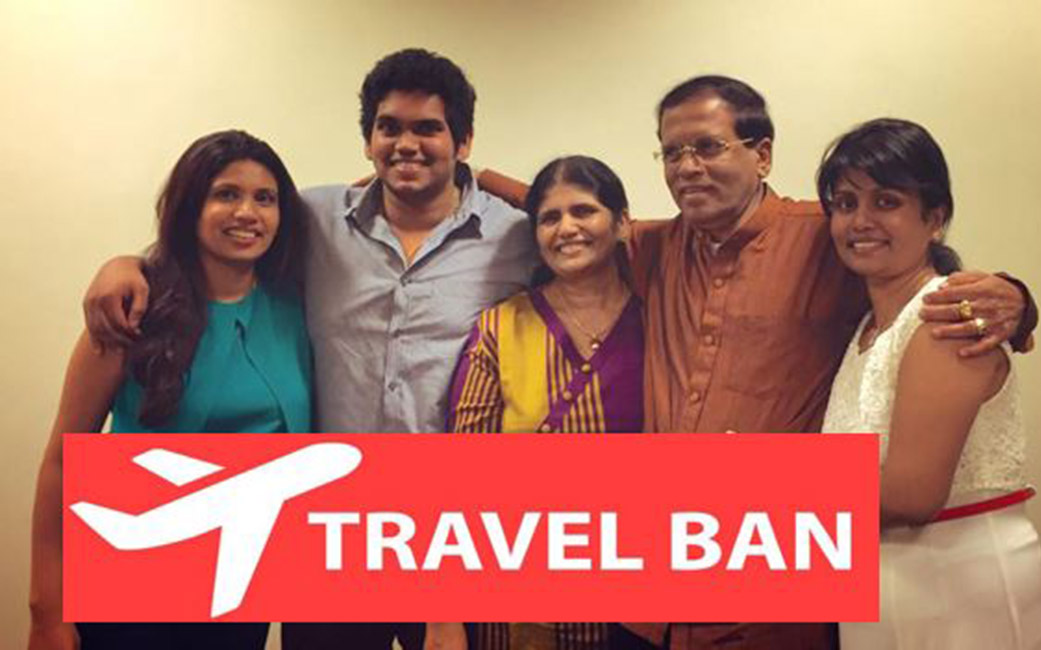
Travel ban on Sirisena & Co.
President Maithripala Sirisena and the first family are facing a potential travel ban from the European Union, diplomatic sources said.
According to sources, the decision to impose a travel ban on president Sirisena and his family will be reviewed at a special meeting of the EU’s European External Action Service (EEAS) which has been scheduled to meet next week.
It was reported that the constitutional crisis that has engulfed the island nation is high on the agenda of the EEAS meeting. The EU has already warned Sri Lanka that the prevailing political crisis could further delay and damage the island’s international reputation and deter investors.
“We consider it essential that Parliament be allowed to demonstrate its confidence by voting immediately when reconvened, in order to resolve the serious uncertainties currently facing the country,” the EU said.
In the absence of adhering to democratic principles by president Sirisena, even after repeated requests by the EU and the international community, has pushed the EU to propose the removal of the GSP+ duty concessions given to Sri Lanka.
However, all parties fighting to preserve democracy, the rule of law and its commitments to good governance, have implored the EU representatives that a decision to revoke the GSP+ benefits would only affect the general population and cause immense hardship. Ranil Wickremesinghe too had echoed the same sentiments, urging the EU not to revoke the GSP+ duty concessions, during his meeting with foreign envoys earlier this week.
As such, diplomatic sources said that the EU will consider taking direct measures against the architects of these unconstitutional actions rather than imposing blanket measures that would severely affect millions of ordinary Sri Lankans.
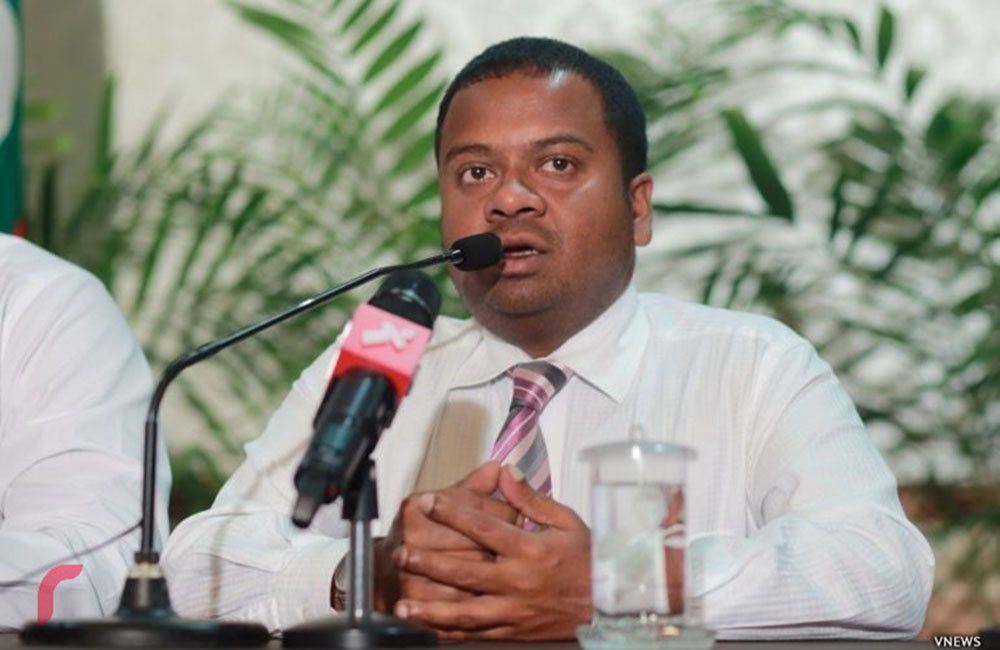
Maldivian Ambassador to Sri Lanka to resign from post
Maldives Ambassador to Sri Lanka Mohamed ‘Mundhu’ Hussain Shareef has decided to resign from his post.
While some media outlets have reported his resignation, Shareef stated that he has decided to resign and that he will be handing over his resignation on Sunday. He had refrained from revealing why he had chosen to resign.
Incumbent President Abdulla Yameen had on the 06th of September 2017, appointed Shareef as the Ambassador, with him having presented his credentials to Sri Lankan President Maithripala Sirisena on the 23rd of October 2017. He was nominated by the outgoing President after the state dismissed his predecessor Zahiya Zareer in August 2017.
Shareef held government posts such as Minister of Youth and Sports as well as Minister of the President’s Office during Yameen’s tenure, he also formerly served as of Ambassador to Japan since August 2016.
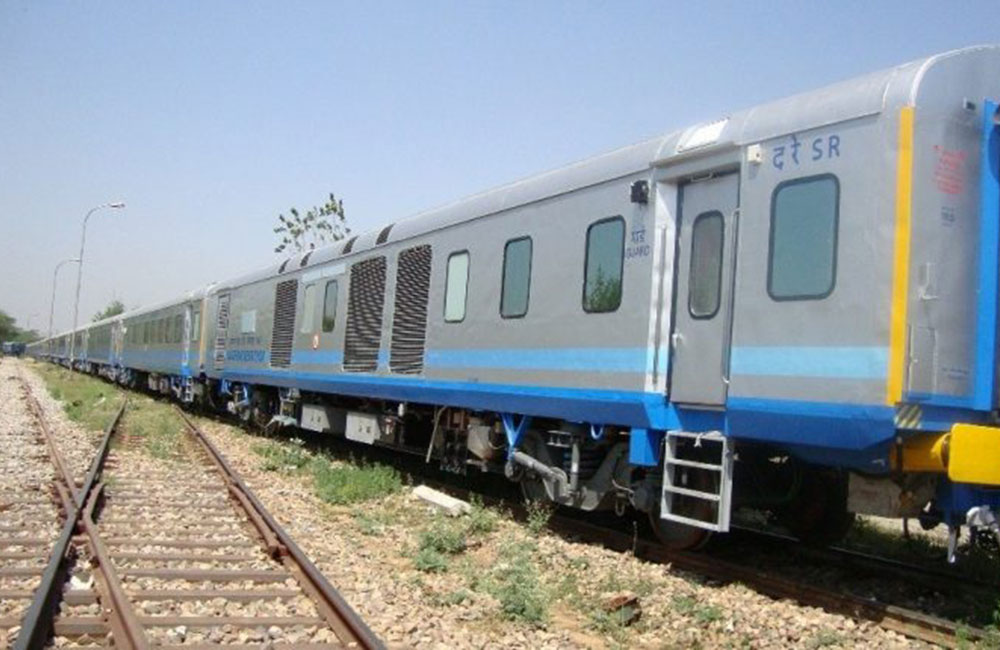
Indian Railways’ main coach manufacturing unit rolls out new trains for Sri Lanka
Integral Coach Factory (ICF), the railways’ premier coach manufacturing unit, has rolled out a special rake of diesel electric multiple unit (DEMU) with an aerodynamic nose and rotatable seats akin to Train-18 for Sri Lanka.
According to sources, the unit is ready to be shipped to the island nation. The train can travel at a maximum speed of 100kmph and can accommodate around 800 passengers.
The ICF has been exporting coaches and coach components to countries such as Malaysia, Philippines, Taiwan, Vietnam, Bangladesh, Sri Lanka, Tanzania, Mozambique, Angola, Nigeria and Uganda since the 1971-72.
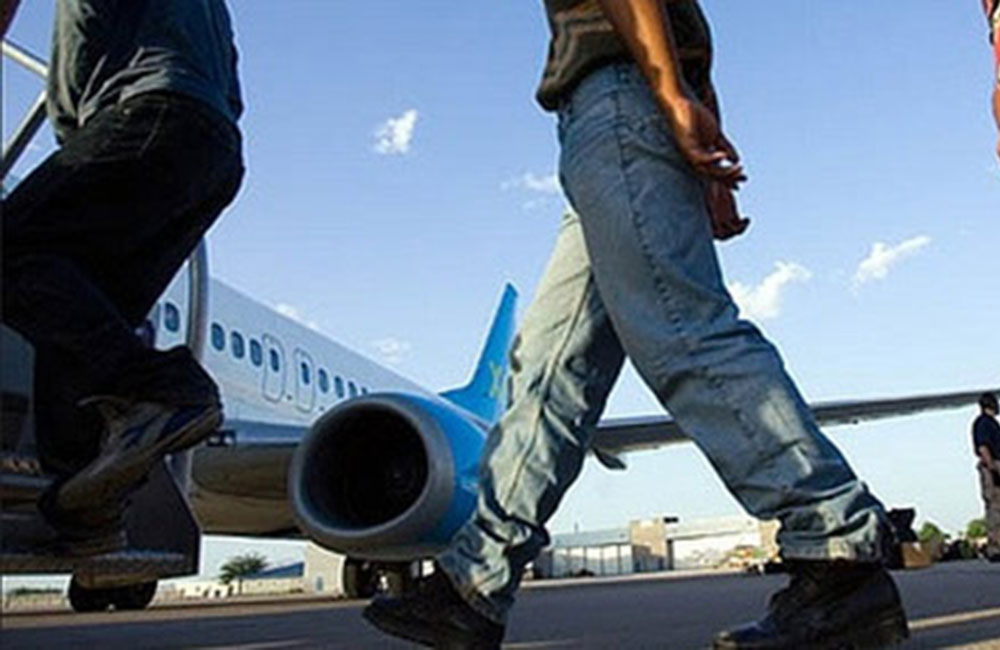
Thirteen Lankan asylum seekers detained in Israel
Thirteen Sri Lankan residents have been imprisoned in Israel for two weeks and deprived of rights, according to a report by KAN Bet. The 13 reportedly fled to Israel on tourist visas after having received death threats following the appointment of Mahinda Rajapaksa as Prime Minister in October, and planned to apply for asylum in Israel.
Following questioning at Ben-Gurion Airport, in the absence of a translator and with one member of the group speaking on behalf of them all, the 11 men and two women were taken to the Yahalom detention facility.
For a week, KAN Bet reported, they were denied access to the outside world, forbidden to make phone calls, denied access to their own belongings and could not change clothes. In addition, they were denied access to medication. One of the group members, who suffers from kidney disease and diabetes, wound up hospitalized at Kaplan Medical Center in Rehovot. Later, the group was transferred to the Givon Prison.
Before they had been taken to Yahalom, one of the group members managed to send a message from his cell phone to the Sri Lankan community in Israel. The community turned to the Hotline for Refugees and Migrants, who then sent lawyers to meet with them.
Following negotiations, they were allowed to briefly enter the Yahalom facility to hear their story and receive a power of attorney to represent the group.
From there, said Hotline for Refugees and Migrants attorney Tal Steiner, the lawyers raced to court because the state was threatening to deport them immediately.
The state, Steiner said, claimed that Yahalom is extraterritorial territory, and the laws of the state do not apply there, therefore, “the state has the authority to hold them there in custody indefinitely and without judicial review.”
The Immigration Detention Review Tribunal in Givon ruled that the detention was illegal and that the group members should have been released immediately, but the state appealed the decision to the District Court. The hearing is set to be held on Monday.
The Immigration Ministry’s Population and Immigration Authority said in response that the Immigration Detention Review Tribunal does not have the authority to hear cases of those whose entry into Israel was denied, and for this reason an appeal was filed with the District Courta
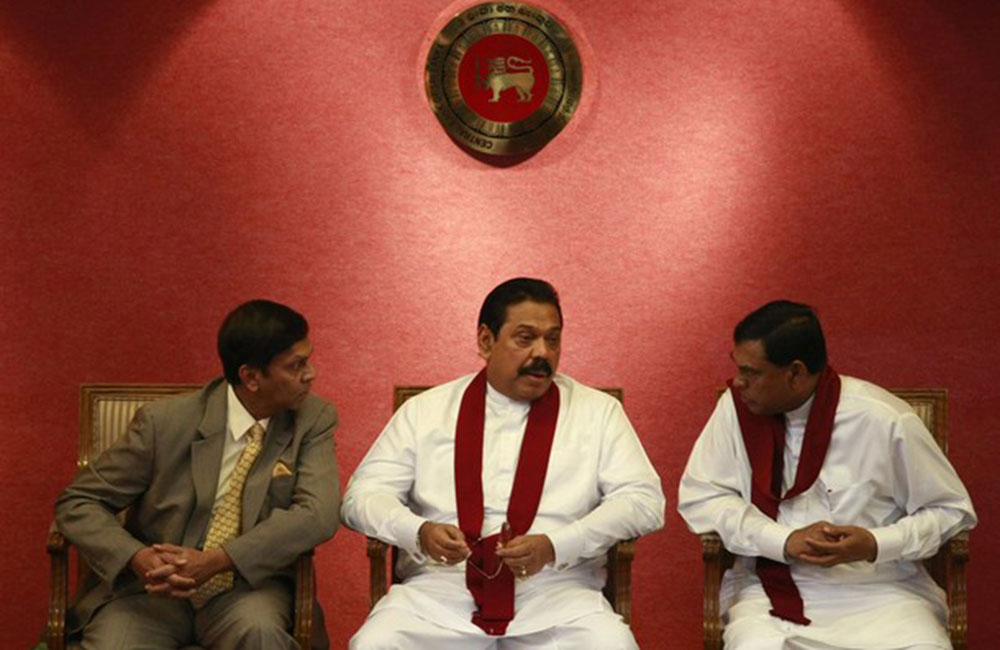
Sri Lanka is being set up for a Balance of Payments crisis
The illegal regime has created political turmoil by changing a government without an election, and compounded matters by announcing unsustainable, populist policy measures at a time of global economic turbulence. As a result, there has been a rapid outflow of US$ 84 billion from our debt and equity markets in just one week.
This illegal regime is setting the country up for a Balance of Payments crisis by selling down reserves to defend the value of the Rupee. It would be instructive to remind ourselves how they tackled previous experiences of such crises.
The first balance of payments crisis they faced started in the second half of 2011. In fact in the budget of November 2011, it was probably the first time in modern history anywhere in the world, that a budget speech announced a forced depreciation of the rupee – an issue that ought to be the realm of the Central Bank’s monetary policy.
The Central Bank continued to stubbornly defend the rupee by selling down valuable foreign reserves to the tune of US$ 4.1 billion. They also imposed a credit ceiling of 18% on all banks in 2012. Interest rates (PLR) shot up from 10.7% to 14.4% between end 2011 and end 2012. What was the net result? The currency crashed from Rs. 113.90 in end 2011 to Rs. 132.55 by end April 2012 along with higher interest rates and a permanent loss of valuable reserves.
But this was not the only measure taken by the government at that time. Let us refresh our memories.
- ·01 January 2011 - Average electricity tariff was increased by 8 per cent.
- ·01 March 2011 - The minimum purchase price of fresh milk at farmgate was increased to Rs.50 per litre from Rs.35 per litre.
- ·02 April 2011 - The retail price of petroleum products were increased as follows: -
Petrol by Rs.10 to Rs.125 per litre
Diesel by Rs.3 to Rs.76 per litre
Kerosene by Rs.10 to Rs.61 per litre
- ·The price of a 12.5 kg cylinder of LP gas was increased by Rs.238 to Rs. 1,890.
- ·03 May 2011 - The maximum retail price of a 400 gram full cream milk powder packet was increased by Rs.20 to Rs.264 and the maximum retail price of a 1 kg full cream milk powder packet was increased by Rs.49 to Rs.647.
- ·20 August 2011 - The price of a 12.5 kg cylinder of LP gas was increased by Rs.156 to Rs.2,046.
- ·30 October 2011 - The retail price of petroleum products were increased as follows: -
Petrol by Rs.12 to Rs.137 per litre
Diesel by Rs.8 to Rs.84 per litre
Kerosene by Rs.10 to Rs.71 per litre
The fun continued in 2012.
- ·12 February 2012 - The retail price of petroleum products were increased as follows: -
Petrol by Rs.12 to Rs.149 per litre
Diesel by Rs.31 to Rs.115 per litre
Kerosene by Rs.35 to Rs.106 per litre
- ·14 February 2012 - Passenger bus fares were increased by an overall average of 20 per cent.
- ·16 February 2012 - A Fuel Adjustment Charge (FAC) was imposed on the monthly electricity bill at the following rates:
Domestic Consumers 0 - 30 (units/month) 25%
31- 60 (units/month) 35%
Above 60 (units/month) 40%
Industries 15% Hotels 15% General Purpose 25%
- ·04 May 2012 - The maximum retail price of a 400 g full cream milk powder packet was increased by Rs. 61 to Rs. 325 and the maximum retail price of a 1 kg full cream milk powder packet was increased by Rs. 163 to Rs. 810.
- ·The price of a 12.5 kg cylinder of LP gas was increased by Rs. 350 to Rs. 2,396.
- ·01 October 2012 - Water tariffs of domestic consumers were revised upward by an average of 60 per cent.
- ·15 December 2012 - The retail price of petrol was increased by Rs.10 to Rs. 159 per litre.
- ·13 January 2012 - Special Commodity Levy (SCL) on the importation of the following food items was increased /imposed for a period of four months.
- ·22 March 2012 - SCL on the importation of the following food items was increased for a period of nine months.
- ·12 May 2012 - SCL on the importation of the following food items was increased for a period of nine months.
All of the above data is from the Central Bank Annual Reports of 2011 and 2012.
In spite of all of these burdens imposed by the government of 2012 on our citizens – the rupee depreciated by 14% in a period of 4 months in early 2012. All of this also took place when global interest rates were low – LIBOR was around 0.5%. Today it has increased by 6 fold – emerging and frontier markets are facing tremendous volatility.
The public would be wise to not be fooled by the cheap, myopic, populist pronouncements on taxes and prices – let us remind ourselves of what is in store for us if this illegal regime continues in power – it will be infinitely worse than what they imposed in 2012.
Page 366 of 510
